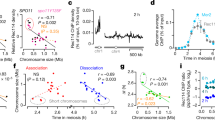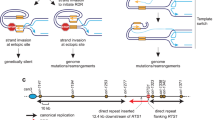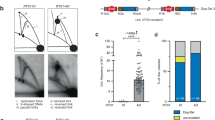Abstract
CURRENT molecular models of meiotic recombination have attempted to explain both classical reciprocal recombination (crossing over) and non-reciprocal intragenic recombination (gene conversion), with a single unified mechanism1,2. An important assumption inherent in such models is that both types of recombination occur during the prophase following premeiotic chromosome replication. To date, however, only crossing over (chiasma) has been convincingly shown to occur during meiotic prophase3. Gene conversion, which has been most extensively studied in the ascomycete fungi4, has, for a number of cogent reasons5, also been assumed to occur during prophase, yet direct evidence supporting this critical point is lacking. In fact, in an important paper6, concerning recombination in yeast, evidence was presented indicating that intragenic recombination and premeiotic replication coincided, a finding which argues against much current speculation. To clarify this situation we simultaneously measured premeiotic replication and gene conversion in the yeast Saccharomyces cerevisiae, and examined the genetic consequences of inhibiting DNA synthesis with hydroxyurea (HU). We show that during the premeiotic S phase cells acquire a ‘potential’ for completing gene conversion, but that the actual formation of stable intragenic recombinants occurs after replication and depends on a period of postreplicative DNA synthesis.
This is a preview of subscription content, access via your institution
Access options
Subscribe to this journal
Receive 51 print issues and online access
$199.00 per year
only $3.90 per issue
Buy this article
- Purchase on Springer Link
- Instant access to full article PDF
Prices may be subject to local taxes which are calculated during checkout
Similar content being viewed by others
References
Holliday, R., Replication and Recombination of Genetic Material (edit by Peacock, W. J., and Brock, R. D.) 157–174 (Australian Acad. Sci., Canberra, 1968).
Whitehouse, H. L. K., Nature, 199, 1034–1040 (1963).
Peacock, W. J., Replication and Recombination of Genetic Material (edit. by Peacock, W. J., and Brock, R. D.), 242–252 (Australian Acad. Sci., Canberra, 1968).
Fincham, J. R. S., and Day, P. R., Fungal Genetics, Third ed., 155–200 (Blackwell, Oxford and Edinburgh, 1971).
Hurst, D. D., Fogel, S., and Mortimer, R. K., Proc. natn. Acad. Sci. U.S.A., 69, 101–105 (1972).
Sherman, F., and Roman, H., Genetics, 48, 255–261 (1963).
Roth, R., and Lusnak, K., Science, 168, 493–494 (1970).
Fogel, S., and Roth, R., Molec. gen. Genet., 130, 189–201 (1974).
Holliday, R., Nature new Biol., 232, 233–236 (1971).
Slater, M. L., J. Bact., 113, 263–270 (1973).
Fogel, S., and Mortimer, R. K., Proc. natn. Acad. Sci. U.S.A., 62, 96–103 (1969).
Hartwell, L. H., J. molec. Biol., 59, 183–194 (1971).
Mortimer, R. K., and Hawthorne, D. C., The Yeasts, 1 (edit. by Rose, A. H., and Harrison, J. S.) 386–460 (Academic, New York, 1969).
Roth, R., and Fogel, S., Molec. gen. Genet., 112, 295–305 (1971).
Croes, A. F., Planta, 76, 209–226 (1967).
Magee, P. T., and Hopper, A. K., J. Bact., 119, 952–960 (1974).
Author information
Authors and Affiliations
Rights and permissions
About this article
Cite this article
SILVA-LOPEZ, E., ZAMB, T. & ROTH, R. Role of premeiotic replication in gene conversion. Nature 253, 212–214 (1975). https://doi.org/10.1038/253212a0
Received:
Revised:
Published:
Issue Date:
DOI: https://doi.org/10.1038/253212a0
This article is cited by
-
Arrest of the mitotic cell cycle and of meiosis in Saccharomyces cerevisiae by MMS
Molecular and General Genetics MGG (1985)
-
Reversible pachytene arrest of Saccharomyces cerevisiae at elevated temperature
Molecular and General Genetics MGG (1982)
-
SDS polyacrylamide gel electrophoresis of chromatin proteins from yeast during vegetative growth and sporulation
Carlsberg Research Communications (1981)
-
Hyper-recombination and mutator effects of the mms9-1, mms13-1, and mms21-1 mutations in Saccharomyces cerevisiae
Current Genetics (1981)
-
Single-strand scissions of nuclear yeast DNA occur without meiotic recombination
Current Genetics (1980)
Comments
By submitting a comment you agree to abide by our Terms and Community Guidelines. If you find something abusive or that does not comply with our terms or guidelines please flag it as inappropriate.



